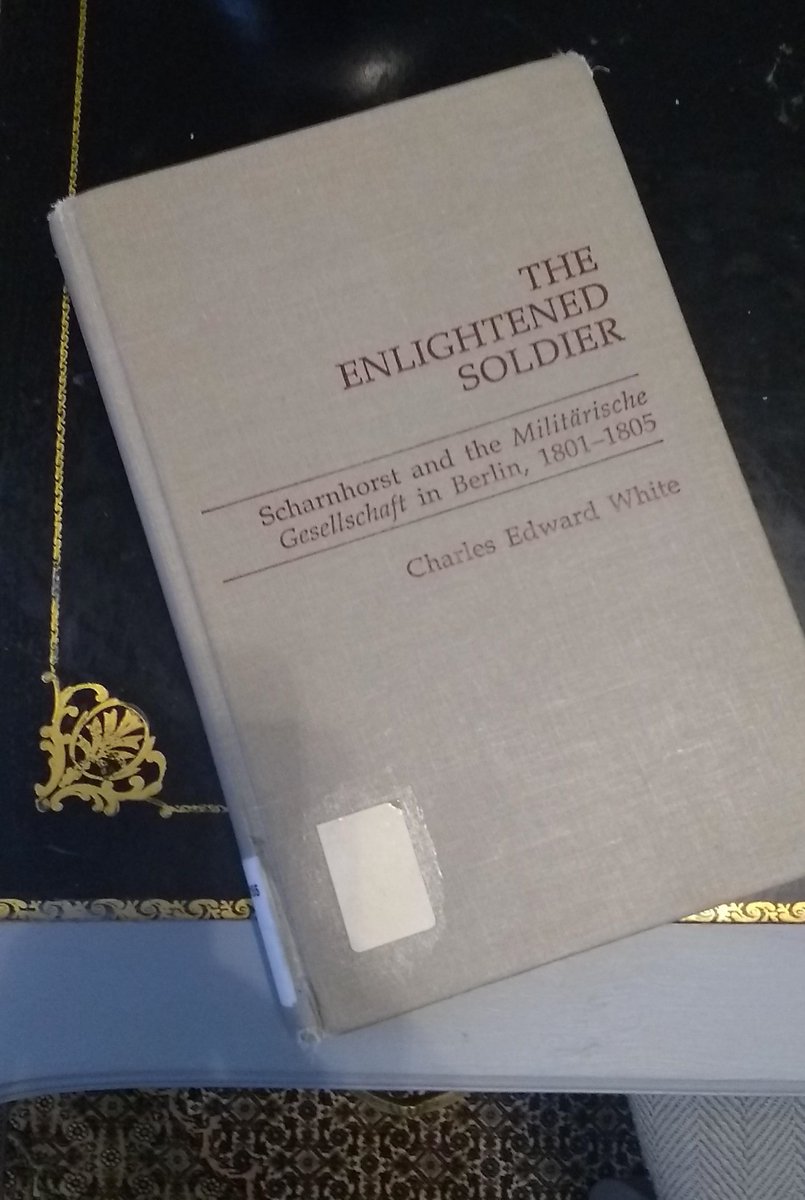How do you completely reshape an army so it can win? That's the story of The Enlightened Soldier that centers around the concept of "bildung," which the author translates to culture. Its essence was the belief that education could perfect a person's character & intellect 1/
Serving in Prussia with a bunch of stuffy aristocrats who mindless drilled their soldiers, the story's hero--Scharnhorst--believed that "disciplined intellect"=essence of the profession of arms xii and arguably he=key driver of 6 yrs of mil reform that defeated Napoleon 2/
To do so he played a key leadership role in the Military Society, a group that met weekly and aped other academic societies typical of the day. This was not just a replacement for experience in combat. Indeed, one couldn't succeed in combat ...3/
unless one was steeped in the "broader avenues of learning outside" the mil profession, so much so that the "ideal solider ... combine[d] the academician and the officer" in one person 6-7 In Prussia, this was more true of artillery & engineers who had more scientific knowledge4/
infantry and cav were too cool for school as good ol' aristocrats. All this learning prepared one to "take the necessary measures in uncertain circumstances," and it req proper balance of theory & application 10 5/
Scharnhorst also ran a journal that encouraged one of his foundational themes: critical thought. Reviewers critiqued books, authors wrote back. As a lt, Scharn. made himself no friends by reviewing a col's book 6/
He also was long interested in integrating the "various arms of the service" and "clarify[ing] their interrelationships in war" 13 But, again, one had to be careful of the limits of one's personal lessons learned in war. He explained, "Those who expect to learn everything... 7/
from experience are like the proud men who believe they already know everything"14 He didn't experience combat until 1793, almost 40 yrs old. With the French hitting his flank, he stopped fleeing infantry, reorg, and helped prevent a rout. The next year greatly out#ed he broke 8/
through a siege. While, like many, he felt the lure of combat, he simultaneously wrote that he wasn't "made to be a soldier." He hated the devastation, much of it heartrendingly senseless.17 In 1801, he left Hanoverian service for many reasons for Prussia...9/
having made his reputation as the "best-known mil writer in Germany" 21 Arriving in Prussia, most people didn't want to hear his ideas for reform, so he had to devise a strategy to succeed. It didn't help matters that he "strolled" along in a slouching non-military manner. 29 10/
Meanwhile, the Prussian officer corps was "hopelessly anachronistic" primarily because it's only a lot of reading if you do it. And its desire to preserve its aristocratic culture ran directly against Scharn.'s "pedagogic ideal: the "necessity for objectivity" 11/
Anyone who tried to shut down freedom of thought was diametrically opposed to the concepts that Scharnhorst put in place to reform the Prussian military and was the prime reason for its "intell sterility" 58 That remains relevant for today in some corners, sadly 12/
But more unique to Germany at that time was the "combination of wide practical experience with a strongly pronounced philosophical spirit"56 Another kind of spirit could also be found in light infantry, which explained French success: indiv soldier=key to victory 59 13/
But Prussia couldn't channel that spirit because aristocracy's hold prevented drawing on full material & moral resources 62 Also France much more adeptly coordinated "mil and pol action" 67 pointing to one campaign he thought had been won before battle because of diplomacy 68 14/
One must deploy forces in order to place one's opponent in a "politically hopeless situation" 69 thus one won by making strategy "contingent upon knowledge" of one's opponent 70 & in battle, good mil org and mutual support among various arms could help make up for bad leaders 15/
This was no great captain theory of warfare, which is why it was critical to guide students "toward independent thought" 93 Then these students should plan for a campaign with "many contingencies, each corresponding to a hypothesis" about enemy's intent. When battle...16/
began, the general's "problem became one of exploration" and "reducing uncertainty to a minimum" 95 but he did not bother trying to make a neat list of scientific war principles 96 17/
PME should center on math and logic to provide an "orderly, coherent approach" to ops and history would provide a "repository of ideas" to help "ascertain possible solutions" 98 18/
The loss at Jena finally made important people like Frederick William III actually bother listening to Scharn., including the est of the Iron Cross to recognize the indiv soldier's combat leadership 139 19/
And this and other key changes, like the est of the general staff, were tested and proved their worth, although Scharn died in 1813 so he did not get to see them fully play out to show that "education made as great a contribution to victory as bravery" 164 20/
Here you can see the intersection of politics and mil strategy leading to success It also helped that Prussia could flexibly command and control with a team, and Napoleon had just he, himself, & him 21/
History, though, was essential to "understand human relationships and to bridge the gap between theory and practice" 182 22/

 Read on Twitter
Read on Twitter



